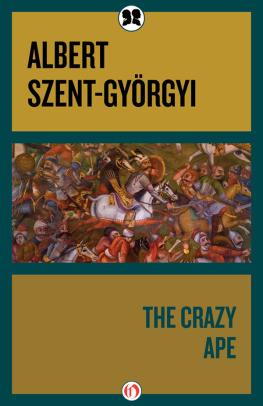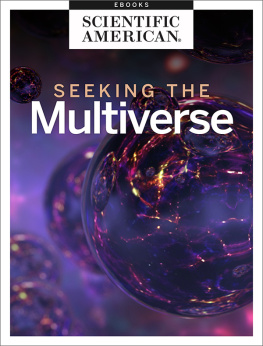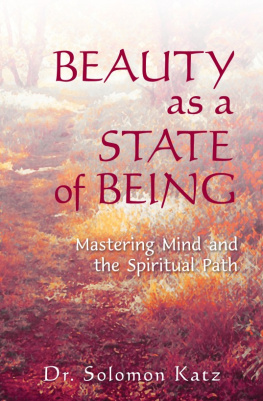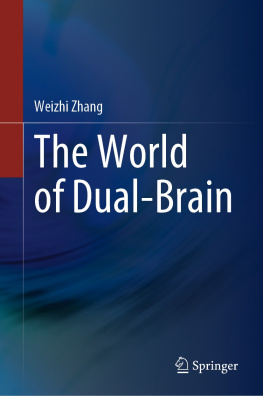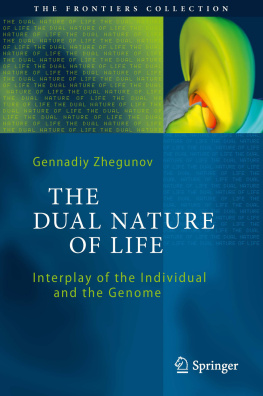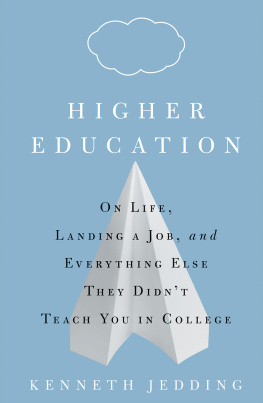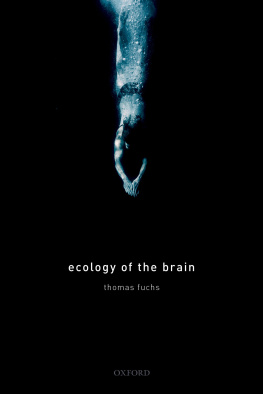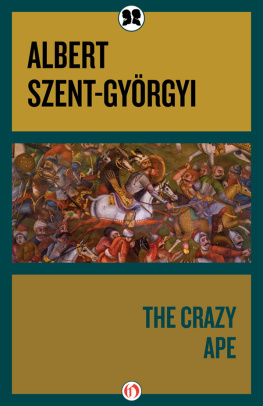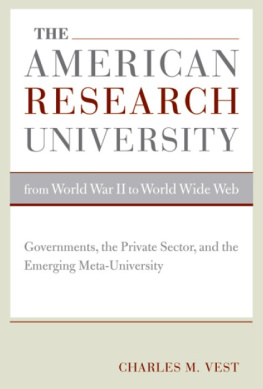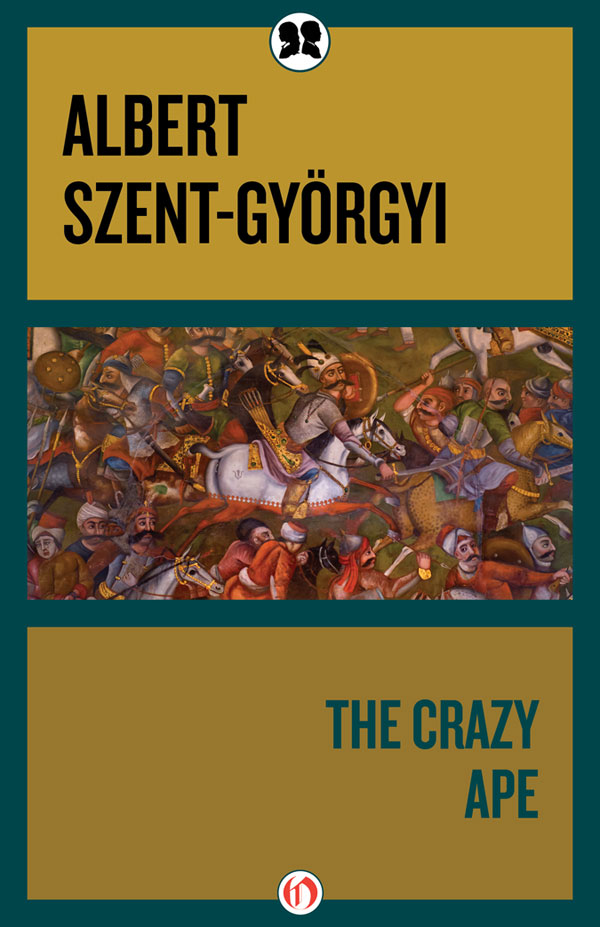The Crazy Ape
Written by a Biologist for the Young
Albert Szent-Gyrgyi, M.D., Ph.D., Nobel Laureate

Contents
FOREWORD
There can be little doubt that mankind is going through the most critical period of its history, a period which can very well end with his extinction in the not too distant future. Countless essays have been written about the causes and cures of this crisis. It has been analyzed from military, political, social, economic, technical and historical points of view. There is one factor, however, that has been largely forgotten: man himselfman as a biological entity. As a biologist, I intend to take this approach in this short book.
Mankind grows like a snake, shedding his skin now and then and acquiring a new skin. This process seems to coincide with the cycle of turbulence and quietude in mans history.
The sage of the Renaissance, Erasmus, distinguished between the quiet and the turbulent periods of history. The turbulent periods were those of sharp transition. The sharper the transition, the greater the tumult. So we have two questions to answer: what creates the sharp transition that is going on today, and how can man be fitted into his new skin? And, of course, the ultimate question: will mankind be able to survive the machinations of present-day men who often appear to act more like crazy apes than sane human beings?
I. THE PROBLEM IS STATED
Why does man behave like a perfect idiot? This is the problem I wish to deal with. Today is the first time in mans history that he is able to truly enjoy life, free of cold, hunger and disease. It is the first time he is able to satisfy all his basic needs. Conversely, it is also the first time in his history that man has the capability of exterminating himself in one blow or making his tragically shrinking, lovely little globe uninhabitable by pollution or overpopulation.
One would expect that any idiot could make a wise choice between these two alternatives. It is basically a choice between pleasure and pain. Yet man seems to be bent on choosing the latter, on bringing about the Kingdom of Cockroaches. Cockroaches are very insensitive to high energy radiation and will find plenty to feed on in a world made barren of the resources needed to sustain human life. In the most affluent country of the world, five per cent of the people are starving. Fifty per cent are starving in the rest of the worldchildren do not get enough food to build healthy minds and bodies, and go to bed hungry. While this is going on the United States alone has spent since the Second World War a trillion dollars ($1,000,000,000,000) on defense, on instruments of mass killing. The Soviets, of course, are not lagging far behind. These are sums too great to be visualized even by the keenest imaginations. They could long ago have lifted mankind to much higher levels of existence. This is a truly criminal story, yet it is not merely criminal. It is utterly stupid too, for what we have bought with all this paranoiac spending are insecurity, jitters, and a ticket for self-extinction, having placed our fate in hands that we have absolutely no reason to trust.
If mankind is really this idiotic, then how did it remain alive through its first million years? There are two possible answers to this question. One is that man is not really that senseless; rather, his circumstances have changed in such a way that he no more fits into his environment, which makes his actions senseless. But one could also conclude that man has always been like he is today, that he has always been self-destructive; he merely lacked the technological means to exterminate himself. Throughout his history there has always been an enormous amount of senseless killing and destruction; if man did not exterminate himself it was only because of the primitive nature and inefficiency of his instruments of killing, which ensured that in any violent conflict many would survive. Modern science has changed this situation, and today we all have to go together.
Whichever of the two theories is correct, if we are to have any hope of surviving it is most urgent that we find out what keeps us in this fateful groove and whether there is a chance and a way of getting out of it.
II. MAN vs. NATURE
Nature is big, man is small; the quality and level of human life has always depended on mans relation to nature, on the measure in which he is able to understand nature and use its forces for his advantage.
The survival of any species depends on its ability to adapt to its surroundings. Man is like any other species in that he has had to adapt himself to the world in which he was born. This world of, say, a hundred thousand years ago, was exceedingly simple, and so were its problems. The main problem was how to get through the day alivefind food, shelter, a sexual partner, whatever simple requirements were needed. So man developed senses which enabled him to distinguish between a bear or a wolf, rocks and trees, all the basic units of his world. His life improved at the rate with which he learned to shape and use things. The discovery of the needle, the wheel, the arrow, fire, metals, the hardening of clay, etc., marked the single stations on his upward road from primitiveness.
These discoveries were based on the everyday experience of man. It was not until that singular upsurge of the human intellect, characterized by ancient Egypt and the Greco-Roman world, that here and there men began to try to understand nature. These efforts can be summed up as the science of antiquity. What was characteristic, on the whole, of the science of this period was a faith in the supreme power of the mind, which, it was thought, could solve all problems. This may be illustrated by the story of the two stones. Aristotle, whose ideas were the last word for many centuries to come, claimed that a big stone falls faster than a small one. What was remarkable about this statement is not that it was wrong, but that it never occurred to Aristotle to test it. He probably would have taken such a suggestion as an insult. Why resort to crude action when the mind could answer all questions? The freedom of human thought is very limited. We all live in a very narrow cage, the spirit of our times, in which we have very little freedom of motion. If, in different ages, people thought differently, this was not because the cage got wider, but because the cage moved. The spirit of his time made it impossible for Aristotle to pick up two stones to see which one fell faster.
In the 16th Century a great change must have taken place in the human mind for, one day, a querulous young man went up the Leaning Tower of Pisa carrying two stones, a big and a small one, to drop them simultaneously, having asked his companions to observe which of the two hit the pavement first. This man, Galileo Galilei by name, distrusted not only the perfection of his mind but also that of his senses, which he improved by building telescopes. By so doing he discovered the satellites of Jupiter, never seen by man before, proving that the universe could not have been built solely for mans pleasure or temptation. This rebirth of the human mind is what is summed up now as the renaissance. Galileo was one of the first visionaries, followed soon by Kepler, Leeuwenhoek, and many others who measured, observed and calculated, building a classical science that reached its peak in Newton, Darwin and Pasteur.
This classical science dealt with the world as man knew it, in which man was born, to which he tried to adapt, in which he lived. Accordingly, this science brought no qualitatively new factors into mans life; it only cleared the inner relations of the surrounding world. This science had an enormous influence on human thought, replacing divine whim by law and order, giving man for the first time an idea of where he was and what he was.

